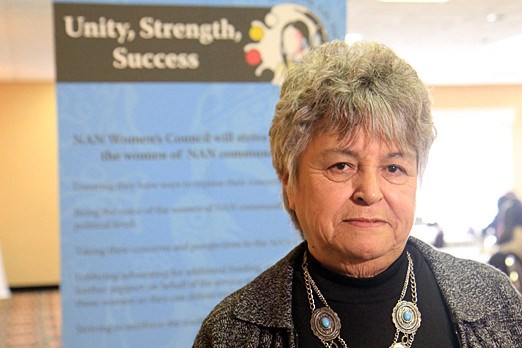Incest survivor Jocelyn Iahtail can say she loves herself.
There was a time when the 43-year-old mother of three wasn’t able to do that. Iahtail, who is from Attawapiskat First Nation, said when she was only four years old she was sexually assaulted by family members. The abuse continued until she was 13 years old.
She said she had trouble telling herself anything positive like ‘she loved herself’. She came to this conclusion when she went to a group session to get help and found that when she was supposed to say that phrase she couldn’t bring herself to do it because she felt it wasn’t true.
“I looked at (the affirmation) and started crying and crying,” Iahtail said. “It was an epiphany for me because that affirmation was ‘I love myself.’ I fully understand that moment and the impacts of that incest and that sexual abuse. I can honestly say to myself that I love myself to the point that I’m willing to stand up for myself and work on my own healing journey for the rest of my life. There is no graduation. No one was coming out saying ‘I am an incest survivor.’”
She said she never had a role model to look up to and was curious when everyone at the treatment centre was talking about some woman named Oprah. She said if Oprah, a sexual abuse survivor, could make it so could she.
Many of the band councilors were related to the perpetrator and had a conflict of interest, she said. If those members are related then they have to step aside when speaking about the case, she said.
“It can be as simple as the conflict of interest policy,” she said. “These things are tools that we can utilize to address the obstacles. Small communities everyone is related to one another one-way or another. When you have dysfunctional leaders, it becomes very problematic in terms of accessing those resources.”
She never turned to alcohol or drugs but instead used humour to try to deal with some of her grief because she had enough work ahead of her so she didn’t want to add more to her plate, she said.
Having faced her tormentors, Iahtail had to experience sexual abuse again but this time as a parent. About 20 years ago, her daughter was also sexually abused by a family member and was also four years old.
“At four years old my daughter told me she was being abuse by her paternal grandfather,” she said. “I had to step up to the plate. I had to take her to the doctor, the social worker, the police and we had to go through the whole process. The fallout from the community quite often is lateral violence because of that fear component and unresolved issues. People will turn on you as if you were the perpetrator.”
But despite all that, she said her daughter is working to become a doctor in order to help people.
Iahtail said she’s never been a political person and was only thrown into the world of politics because she wanted a better life for her children. She said she especially wanted to help her 13-year-old-son who has special needs.
She has received little support for her son and many of her requests fallen on deaf ears, she said. Her son needs special education, an assistance worker and all sorts of help, which Iahtail said she’s not getting.
That’s why she attended the fifth annual Nishnawbe Aski Nation Women’s Forum at the Nor’Western Hotel in order to bring these issues to the groups’ attention. The three-day conference, which started on Friday, had more than 80 participants from all 49 NAN communities in attendance. The conferenced theme focused on the abuse of women in those communities.
It’s one thing to blame the federal and province government, but when there’s problems with their administration then they have to address those issues as well, she said.
“We need to address the core issues,” she said. “It’s more than just housing and financial frustration. What is the root of those problems?”
Jackie Fletcher, spokeswoman for the NAN Women’s Council, said the conference is going well and many are getting their stories told. She said the main issues the conference wanted to address were the different types of abuse women go through.
She said they want to come up with a strategy for community resolutions.
“The communities are very complex and difficult because everyone is related,” Fletcher said. “If you have a councilor that’s in the community and you’re having trouble with one family and that councilor happens to come from that family then you aren’t going to go to that councilor and talk about anything. Many times people have to leave the community and that’s very costly. It’s a real dilemma in the isolated communities.”
Fletcher’s advice for those that needed help was to go back to the land and seek guidance there.
Follow Jeff Labine on Twitter @Labine_reporter
Sign in or register
- Messages
- Post a Listing
- Your Listings
- Your Profile
- Your Subscriptions
- Your Likes
- Your Business
- Support Local News
- Payment History
Registered Users
Already have an account?
New Users
Create a free account.
